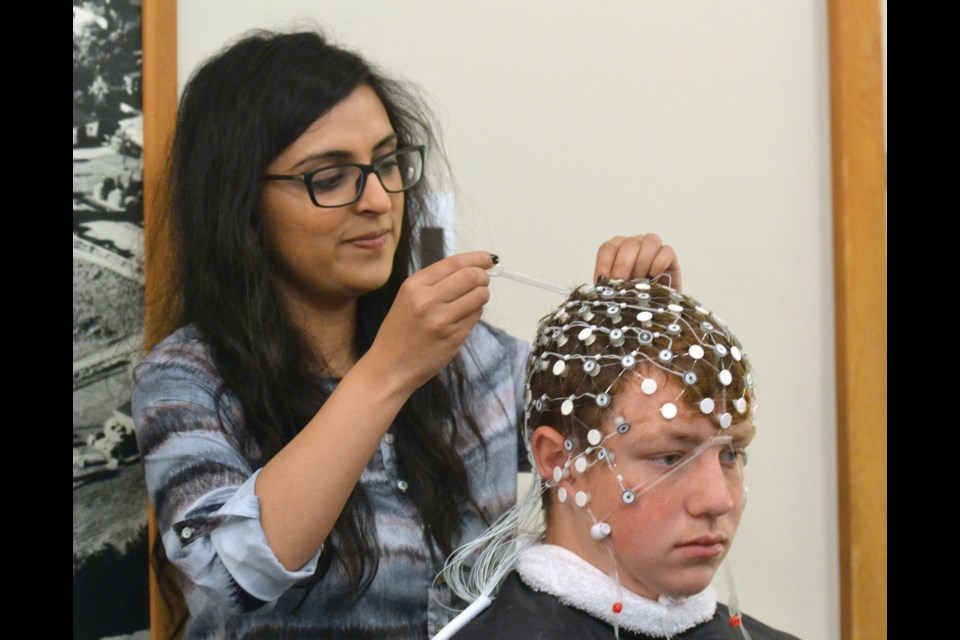Richmond FC is ahead of the game when it comes to prevention and treatment of concussions.
The youth soccer association, that features nearly 1,400 boys this season, has eliminated heading in games and training for all players ages 10 and under. It has also teamed up with the Djavad Mowafaghian Centre for Brain Health at UBC for a leading edge baseline testing system.
Richmond FC chair Rein Weber admits the removal of heading at the grassroots level serves two purposes — protecting young players and enhancing ball control and skill development.
Research in recent years has shown sub-concussive headers, at a very young age, can potentially result in a type of brain injury that falls short of being diagnosed as a concussion. Mini-games will now see play stopped and a free kick rewarded if the ball is lofted too high. Goal and corner kicks must also be played along the ground.
“To protect the player, there just doesn’t need to be heading 10 and under,” said Weber. “This will also help the kids learn to pass and control the ball better. We want their game to develop and learn to play the right way.”
At the same time, Richmond F.C.’s partnership with UBC is giving its players the opportunity to be part of a pilot test that is taking baseline testing to a new and more accurate level thanks to EEG (electroencephalography) scanning.
The project is being overseen by Dr. Naznin Vrji-Babul who says EEG scanning will help significantly in taking the “guessing game” out of brain injuries, especially involving youth.
“What we are trying to do is develop an objective measure, whether if something has actually happened to the brain,” explained Dr. Vrji-Babul.
“Kids want to go back to playing. They don’t want to stay off the field, and, of course, we can’t see (the injury).
“What we are going to do with our measures is actually show them a picture of what the brain looks like before and after the concussion so they can visually be able to see it. We want kids to understand concussions are serious and it does effect your brain. This will give them that information.”
Richmond FC is picking up the bulk of the cost for the testing with parents only paying $10 for the 30-minute process that also includes a traditional neuropsychological evaluation. Although it’s highly recommended, the procedure is voluntary and roughly 15 percent of the club’s registration is participating.
Weber hopes to push the number closer to 50 percent moving forward.
“This has evolved quickly from the summer time and it does take a process to get to this point. Next year, it will be different pathway. The UBC team has handled all the work and done a fantastic job,” he said.
Should a Richmond FC player sustain a concussion, he will be recommended to go to UBC for testing within 72 hours of the injury, even if he had opted not to go for EEG scanning. Further testing will be scheduled over six months from the initial visit to see how the injury has progressed.
His family physician can also refer him to Dr. Paul Korn, a paediatric emergency medicine expert at B.C. Children’s Hospital, for a detailed diagnosis. It all adds up to the player safely returning to action. Coaches are also being asked to do their part.
“We have given them some tools to spot assess,” added Weber. “If there is any kind of head contact and the coach is unsure, the player doesn’t go back on the field. We can’t prevent injuries but it’s how we deal with it afterward and support the recovery.”
UBC will also soon be bringing EEG scanning to Seafair Minor Hockey who have put its players through baseline testing for a number of years. Dr. Vrji-Babul’s ultimate goal is eventually getting all sports organizations onboard and create a large data base.
“Most of these kids play so many other sports,” she said. “We really need a data base for all the kids in Richmond. Having the knowledge kids might have concussions from other sports as well would make a big difference.



